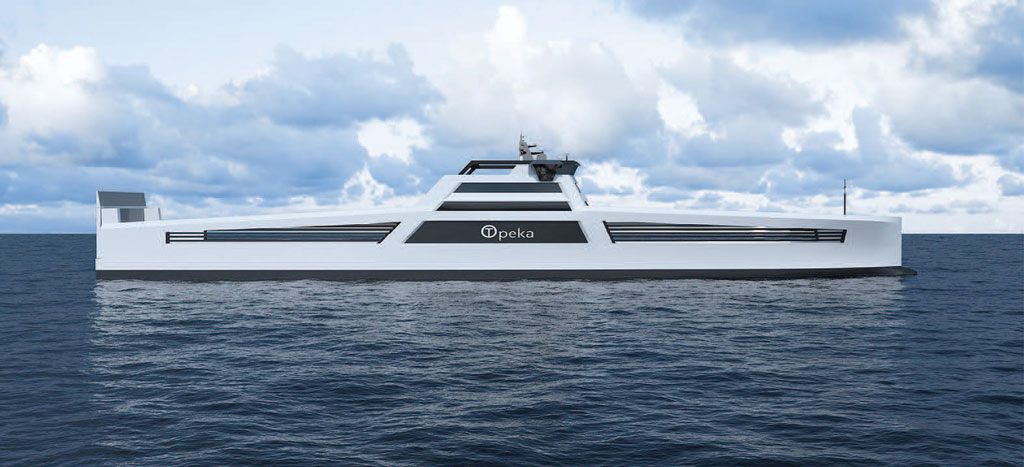Carriers and shippers are working toward reducing emissions and exploring other solutions
In June 2021, Höegh Autoliners announced plans to acquire 12 multi-fuel vessels, each with a capacity of 9,100 car equivalent units (CEU). In March, Höegh completed its first carbon-neutral voyage from Europe to South Africa, with a vessel using biofuels.

These developments are emblematic of a trend that is proceeding among many roll-on/roll-off (ro/ro) carriers and shippers. Among other developments, Volkswagen has begun to use, and BMW is testing, biofuels in vessels that deliver their vehicles. Wilhelmsen Ship Management is exploring a variety of potential solutions, including the use of hydrogen fuel cells aboard ships. (For more on hydrogen developments, see Ro/Ro carriers experimenting with hydrogen to achieve zero emissions)
IMO Greenhouse Strategy
In April 2018, the IMO announced a greenhouse gas strategy to improve carbon dioxide efficiency in shipping. IMO targets include a 45% reduction in carbon emissions within the next decade and net zero emissions by 2050. IMO data indicate that maritime transportation emits 940 million tons of CO2 annually, accounting for 2.5% of total global greenhouse gas emissions. The marine fuel industry has already transitioned from a sulfur cap of 3.5% sulfur in bunker fuel emissions on the high seas to 0.5%, after an IMO mandate took effect on January 1, 2020.
Höegh’s contemplated vessel acquisitions, known as the Aurora class, are the first in the industry to be ready for operation on ammonia, a carbon-neutral fuel, making them the largest and greenest pure truck and car carriers (PCTCs) to be built, according to Lise Duetoft, Höegh Autoliners’ chief strategy and analytics officer. “We anticipate delivery of the first of the new series of vessels in the beginning of 2024,” said Duetoft. “This will put us in the forefront of sustainable transportation.”
Höegh’s carbon-neutral voyage from Europe to South Africa in March 2021, by way of the Höegh Trigger, ran on advanced biofuels, as part of an arrangement with the Dutch company GoodFuels. The biofuel chosen for the test run burned virtually free of sulfur oxides and reduced the vessel’s carbon emissions by as much as 90%. “The use of biofuel can contribute significant steps towards decarbonization in the maritime transportation industry,” said Andreas Enger, Höegh’s CEO.
Biofuels are considered “drop-in” replacements for traditional marine fuels, which means they do not require modification of onboard systems or fuel tanks. “They are a scalable, sustainable, technically compliant, affordable, and market-ready solution,” said Isabel Welten, chief commercial officer at the Amsterdam-based GoodFuels.

Vehicle Supply Chain Implications
Volkswagen is pushing to lower carbon emissions in all of its operations, including the ocean-going ships that deliver the cars and trucks it manufactures to foreign markets. The company distributes its vehicles around the world using several hundred commercial ships and 11 chartered vessels, shipping over 2.8 million vehicles on 7,700 ocean voyages each year.
In 2020, the Volkswagen Group began using two new cargo ships powered by liquefied natural gas (LNG) for transatlantic voyages. Although LNG is a fossil fuel, it burns cleaner than others, reducing carbon emissions by around 25%.
In November of last year, Volkswagen started using a fuel made from vegetable residues acquired from restaurants and the food industry on two chartered vessels that make regular trips from the port of Emden, Germany, to Dublin, Ireland, Santander, Spain, and Setubal, Portugal. As the first automaker to make widespread use of this fuel, “we reuse waste oil in an environmentally compatible way,” said Thomas Zernechel, head of Volkswagen Group Logistics. The two vessels make around 50 voyages a year, carrying 250,000 Audi, SEAT, Škoda, and Volkswagen vehicles.
Last year, the German auto manufacturer BMW partnered with the ro/ro carrier United European Car Carriers (UECC) to advance biofuel trials on UECC’s vessels. Trial runs took place on the M/V Autosky, testing a biofuel derived from used cooking oil on a route between Zeebrugge, Belgium, and Santander, Spain. Use of the biofuel reduced sulfur oxide emissions by nearly 100% and CO2 emissions by at least 80%, according to a BMW statement. The initiative also supports “BMW’s target of achieving a carbon-neutral supply chain,” the statement added.
Decarbonization and Innovations
Wilhelmsen Ship Management, parent company of Wallenius Wilhelmsen, the operator of a fleet of 126 ro/ro vessels, has singled out decarbonization, along with marine pollution, and renewable energy, as the keystones of its environmental efforts. The company has initiated a program that will progress through the end of 2022 to identify hundreds of technology startups, each seeking solutions to the issue of carbon emissions in the shipping industry. The program is expected to yield around 100 pilot ventures during that time.
Partnering with Rainmaking Innovation, a London-headquartered company that has accelerated over 750 technology ventures globally, the program has so far identified 1,200 promising startups in 70 countries, of which 145 candidates have been fully vetted and a final group of 51 selected for the program kick off. At an initial workshop, each startup pitched its proposed decarbonization solutions, and those deemed most likely to succeed were matched with collaborating companies, including MC Shipping, a subsidiary of Mitsubishi Corp., and Wilhelmsen.
“Efforts such as these are essential to decarbonizing shipping within the next ten years,” said Tarun Mehrotra, director of trade and transportation at Rainmaking. Taking action in the coming decade is crucial to controlling climate change, Mehrotra added, “and ensuring the resiliency of supply chains during a crisis like the one we are presently experiencing.”
The startups are addressing the issue of reducing carbon emissions in a variety of ways. In addition to developing alternative energy sources, other potential solutions include artificial intelligence; data-enabled CO2 reduction; increasing energy efficiency; automation, infrastructure and business model innovation; carbon offsetting; and improved vessel design.
The Wilhelmsen program is “accelerating technology capabilities to help the maritime industry tackle big issues,” said Nakul Malhotra, a Wilhelmsen vice president. “We are excited to see the tangible steps being taken and look forward to maintaining the partnership.”





